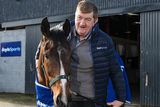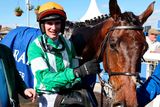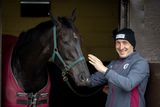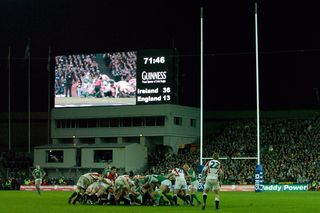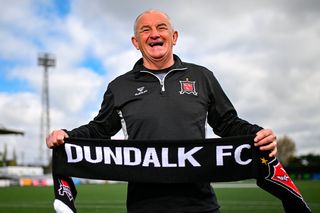Richard Forristal: Hats off to John Kiely as 'Lough' takes gold
Aintree Grand National looks a likely target for Leopardstown hero


Any analysis of the Irish Gold Cup must first acknowledge the superlative feats of John Kiely and Mark Walsh.
For Kiely to bring Carlingford Lough back from two dismal outings to claim such a dramatic edition of the three-mile Grade One took some doing.
The reticent veteran continues to enhance his status as one of the sport's largely unheralded geniuses.
It would be overstating it to put Walsh on that sort of pedestal, but he is cut from a similar cloth.
While he says little, he takes his chances, and his persistent turn at Leopardstown on a horse that looked spent two-out was a reminder of his range of talents.
Walsh makes few mistakes, which is what you expect of a top rider. He will soon turn 30, so he is entering his prime years as a jockey.
After winning the €150,000 event last year, Carlingford Lough was destroyed in the Gold Cup at Cheltenham. It's hard to see why it would be any different this time, and Kiely might instead consider a tilt at the Grand National.
Carlingford Lough has been beaten an average of 20 lengths in visits to Cheltenham the past two Marches, which is telling.
Despite being the reigning title-holder of the old Hennessy crown, he returned the longest priced winner of the race at 20/1.
As the field turned for home, you could have thrown a blanket over the 10 runners, which was also the joint-biggest field to contest the race. To see so many in close proximity so late on hardly suggests that it was an especially good renewal.
Beforehand, Road To Riches looked the only serious Gold Cup candidate. On good ground at Cheltenham, he might still be, although it remains a mystery why he is ridden so aggressively, especially in gruelling conditions.
At Cheltenham in March, forcing tactics on soft ground undermined his prospects. It was a similar story here. When Patrick Mullins sent On His Own on early, it briefly unsettled Road To Riches' jumping.
However, he then got into a lovely rhythm for a full circuit, only for Bryan Cooper to attempt to seize control when On His Own blundered at the first down the back.
Road To Riches was racing from a long way out and led into the straight, and it might have been no mean feat that he finished second.
Cooper is probably only riding to instructions, but the tactics seem ill-advised. When Road To Riches won the 2014 Lexus, he initially led before On His Own took over.
That day, though, Cooper rode the race as he found it and let the horse travel where he was comfortable, just off the pace. He didn't lead again until 50 yards out.
Since then, the brief seems to be to force the issue at every remove.
To these eyes, it doesn't serve Road To Riches well and, while his defeat was disappointing, he could still be a player in the Gold Cup - if the ground is less soft and the tactics are less rigid.
Gigginstown's Valseur Lido looked to be on the verge of giving Willie Mullins a 10th win in the race when he unseated Ruby Walsh at the last. By then, Carlingford Lough was challenging, so it was by no means a fait accompli.
When Walsh was recently being heralded for his Velcro-like heroics on Killultagh Vic, he pointed out that the horse had helped him by staying straight.
The opposite happened on Saturday, with Valseur Lido swerving to keep its balance. Walsh will be sick he slipped off but he knows better than anyone that you are in the lap of the gods once a horse goes one way or the other.
Valseur Lido clearly has an engine - he is a dual Grade One winner - but he often doesn't run quite as well as you would expect. Saturday's display surely entitles him to a cut at the Gold Cup, but you couldn't trust him to back it up.
With Vautour, Djakadam, Don Poli, Cue Card and even Smad Place in the mix, we probably didn't see the Gold Cup winner on Saturday.
Still, Saturday's card was another reminder of the game's unpredictability. Mullins departed with four wins, including three Grade Ones, and Walsh wasn't on a single one of them.
That is a mark of the depth of ammunition at Mullins' disposal. Victories for Footpad (the outsider of three for the stable that led home a reverse Closutton 1-2-3), Bleu Et Rouge (another third string) and Outlander mean that Mullins's Grade One ratio for the year is 8-10, or 8-9 in races contested.
As was the case on Champion Hurdle day, Leopardstown's figures were grim. Attendance fell 17pc to 9,336, while the bookmakers' take crashed 29pc to €848,647. They are further reminders of the growing indifference to the sport in this country right now. People are voting with their feet, and it isn't enough for Horse Racing Ireland to trot out the same line every year about there being signs of the thing bottoming out. If patently isn't.
Mullins is only doing his job - as Liam Burke said recently, what he has was there for anybody - and he does it better than the rest. Others now need to do theirs. HRI's conservative up-and-down policy of increasing purses, fixtures and graded races and trimming costs doesn't adequately serve enough of the industry.
We observed last week how the decision to re-open weight-for-age races that don't attract five or more declarations was a case of treating the symptoms of the ailment, not the cause. So far, two races have been re-opened. Not one extra horse was added to either field, with just three and four horses contesting chases at Clonmel and Naas in recent days.
The reasons for that are not hard to identify; the spread of horses in training simply doesn't exist for there to be sufficient numbers to fill these sort of races when doing so would come at too high a cost in a handicapping sense.
Getting crucified in the ratings for finishing too close to a Bright New Dawn or a Gitane Du Berlais is as much of a deterrent now as it was before purses were increased and declaration times extended. A more lateral approach is required to address the causes of the malaise.
Steroids really hard to police
Last week's publication of the Anti-Doping Task Force's report that was jointly commissioned by HRI and the Turf Club is to be welcomed.
The panel clearly did their research and there is an obvious intent there to be proactive in the war against drug cheats. That, though, doesn't mean that illicit steroid use will be easy to police.
The Turf Club has begun the process of identifying an Anti-Doping and Equine Welfare Officer to head up a niche unit.
However, establishing authority over unlicensed individuals will be a challenge. There is no onus on an owner or breeder or trader to grant the Turf Club access to their property to test a young horse.
There is a school of thought that suggests that, if there is an area in which steroids are used to some extent as a matter of routine, it is in an effort to hasten unbroken youngsters' physical development.
That means that the Turf Club must somehow establish jurisdiction over all thoroughbred foals that have been bred to race from the day that they are born.
Discussions are taking place with the Irish Thoroughbred Breeders Association, and the sooner an agreement is reached, the better.
Beefing up intelligence is critical, as targeted raids in tandem with the Department of Agriculture, which has search and seize powers, will be key to weeding out cheats.
As for the recommendation of a lifetime ban for any horse that tests positive for a performance-enhancing substance, it does seem quite a draconian measure for what you might describe as the most innocent party in the crime.
Question marks would clearly hang over any individual who has had through their hands a horse that tests positive for steroids, be they culpable or entirely innocent.
That is hardly desirable, so there must be an enhanced focus upon identifying and then dealing similarly categorically with human culprits, without fear or favour.
Fagan fails to pick Scottish pockets
Gordon Elliot's two Musselburgh runners yesterday failed to score, with Fagan second and Taglietelle third. Fagan is among six raiders declared at the Scottish venue today.
Shane Shortall enjoyed a more fruitful expedition, teaming up with Iain Jardine to take the Scottish County Hurdle on Shrewd (5/1), his only ride of the day.
Tweet of the weekend
Cathryn Fry (@CathrynFry)
Poor Carrigmoorna Rock. Absolutely loved that mare. Sleep tight, sweetheart.
One racing fan spoke for us all after Carrigmoorna Rock's fatal fall at Naas. It was a sad postscript to the day for Robert and Mary Tyner, which was made all the more poignant as it was the fifth anniversary of the death of their beloved 19-year-old son, Jack.
Numbers Game
186 A Sandown brace on Saturday saw Richard Johnson equal his previous personal best of 186 winners (2004) with four months to spare.



